Mark Allen (businessman)
Last updatedMark Allen | |
|---|---|
| Born | 3 July 1950 |
| Education | Dragon School Downside School |
| Alma mater | Exeter College, Oxford |
| Occupation(s) | Intelligence officer, businessman, lecturer |
| Spouse | Margaret Mary Watson |
| Parent | Peter Muir Spurgeon Allen |
Sir Mark John Spurgeon Allen KCMG (born 3 July 1950) is a British diplomat, intelligence officer, and businessman.
Contents
Early life
Mark Allen was born on 3 July 1950. [1] His father, Peter Muir Spurgeon Allen, was headmaster of Cokethorpe School in Oxfordshire. He was educated at the Dragon School, Oxford, and at Downside School, the Roman Catholic public school in Somerset. [1] He then read Arabic and Turkish at Exeter College, University of Oxford. [1]
Career
Allen joined the British Foreign Service, where he worked for 30 years. After studying at the Middle East Centre for Arab Studies, he was posted to Abu Dhabi in 1974. There he developed his love of falconry from his contacts with the Bedouin, to the extent that he wrote a series of books on the subject, including Falconry in Arabia (1980). He then spent much of the rest of his operational career in the Middle East. [2]
In 2003, as head of MI6’s counter-terrorism unit, Allen and Stephen Kappes of the CIA led talks that resulted in an end of support for terrorist activity by Colonel Muammar al-Gaddafi and of international sanctions against Libya.[ citation needed ]
Confidential documents discovered by Human Rights Watch in Libyan Government offices, following the fall of the Gaddafi regime, suggested the involvement of the British Government in rendition operations. These included a fax apparently sent from Sir Mark to the Libyan authorities in March 2004, saying:
"I congratulate you on the safe arrival of [Mr Belhaj]. This was the least we could do for you and for Libya to demonstrate the remarkable relationship we have built over recent years.....Amusingly, we got a request from the Americans to channel requests for information from [Mr Belhaj] through the Americans. I have no intention of doing any such thing. The intelligence about [Mr Belhaj] was British... I feel I have the right to deal with you direct on this”. [3]
After losing out to John Scarlett in his bid to become head of MI6, in which he was supported by his friend Jack Straw, Allen resigned in 2004.[ citation needed ]
After a six-month sabbatical, Allen became a senior advisor to the Monitor Group, a global consulting and private equity firm. [2] He was also approved by the Cabinet Office and then UK Prime Minister Tony Blair to be allowed to work immediately as a special advisor for BP. [2] Allen used his contacts in both the United Kingdom and Libya to resolve the issues surrounding the release of Abdelbaset Ali al-Megrahi in relation to the Lockerbie bombing. Allen developed his relationships with the Libyan regime through Gaddafi's son Saif al-Islam, who studied for a Ph.D. at the London School of Economics. BP later signed a £15 billion contract with Libya for a joint venture in oil exploration and extraction.[ citation needed ] In 2010, he was requested to appear before the US Senate committee investigating the release of al-Megrahi in relation to BP's oil deal, something which as an advisor to BP he was blocked from doing. [4] In 2007, he helped broker the release of Bulgarian nurses imprisoned in Libya on charges of having injected HIV virus into children. [5]
On 6 September 2011, The Independent newspaper claimed that Allen had been implicated in the arrest of Abdelhakim Belhaj in March 2004 in Thailand, and the subsequent torture of Belhaj by Gaddafi's regime in Abu Salim prison in Tripoli, Libya. [6] In 2014 Britain's Crown Prosecution Service decided not to charge Allen for his role, on the grounds they had insufficient evidence, even though the Metropolitan Police had provided them with a 28,000 page dossier. [7] In October 2016 Belhadj appealed the dismissal. Belhadj's appeal relies on communication from Allen, [8] found in the offices of Moussa Koussa the head of Muammar Gaddafi's Intelligence service, after those offices were stormed by opposition forces, when Gaddafi was overthrown.
Allen is a Senior Associate and honorary fellow of St Antony's College, Oxford, [1] and is a member of the board of the Hospital of St John and St Elizabeth in St John's Wood, London. [9]
Personal life
Allen married Margaret Mary Watson in 1976 and has two children. He was inducted into the Order of St Michael and St George in 2002, and knighted in 2005. [2] A devout Roman Catholic who has edited a book of prayers for the young, [10] he lives in Westminster.[ citation needed ]
Books
- Arabs: A New Perspective, Continuum International Publishing Group, 2006.
- With Hossein Amirsadeghi, Sky Hunters: The Passion of Falconry, Thames & Hudson, 24 November 2008
- Tribes: Tribalism in the Arab World, Continuum International Publishing Group, due October 2009.
- First Holy Communion: With a foreword by His Excellency Archbishop Giovanni Tonucci
Related Research Articles

Muammar Muhammad Abu Minyar al-Gaddafi was a Libyan revolutionary, politician and political theorist who ruled Libya from 1969 until his killing in 2011 by rebel forces. He first served as Revolutionary Chairman of the Libyan Arab Republic from 1969 to 1977 and then as the Brotherly Leader of the Great Socialist People's Libyan Arab Jamahiriya from 1977 to 2011. Initially ideologically committed to Arab nationalism and Arab socialism, Gaddafi later ruled according to his own Third International Theory.

The Scottish court in the Netherlands was a special sitting of the High Court of Justiciary set up under Scots law in a former United States Air Force base, Camp Zeist in Utrecht, in the Netherlands, for the trial of two Libyans charged with 270 counts of murder in connection with the bombing of Pan Am Flight 103 over Lockerbie, Scotland, on 21 December 1988. A school on the former base was converted into a judicial court for the trial.
The Libyan Islamic Fighting Group (LIFG), also known as Al-Jama'a al-Islamiyyah al-Muqatilah bi-Libya, was an armed Islamist group. Militants participated in the 2011 Libyan Civil War as the Libyan Islamic Movement, and are involved in the Libyan Civil War as members of the Libya Shield Force. Alleged militants include alleged Al Qaeda organizer Abd al-Muhsin Al-Libi who now holds a key command position in the Libya Shield Force.
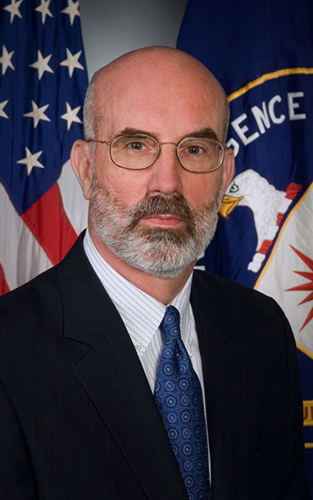
Stephen R. Kappes was the Deputy Director of the Central Intelligence Agency (DDCIA), until his resignation on April 14, 2010. He had served in the CIA since 1981, with a two-year hiatus. A career clandestine operations professional, Kappes supervised the extraordinary rendition program, a non-judicial system of rendering persons suspected of terrorism to secret locations where most of them were interrogated. Kappes also helped persuade Libyan leader Muammar al-Gaddafi to abandon his nuclear weapons program in 2003. In 2009, Kappes was convicted in absentia by an Italian court for his headquarters-based role in the rendition and torture of an Egyptian citizen who was kidnapped from Italian soil by the CIA.

Abdelbaset Ali Mohamed al-Megrahi was a Libyan who was head of security for Libyan Arab Airlines, director of the Centre for Strategic Studies in Tripoli, Libya, and an alleged Libyan intelligence officer. On 31 January 2001, Megrahi was convicted, by a panel of three Scottish judges sitting in a special court at Camp Zeist in the Netherlands, of 270 counts of murder for the bombing of Pan Am Flight 103 over Lockerbie, Scotland, on 21 December 1988 and was sentenced to life imprisonment. His co-accused, Lamin Khalifah Fhimah, was found not guilty and was acquitted.
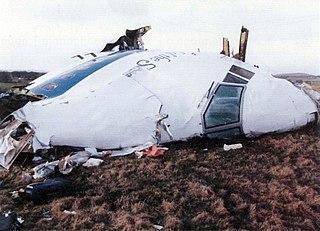
Pan Am Flight 103 (PA103/PAA103) was a regularly scheduled Pan Am transatlantic flight from Frankfurt to Detroit via a stopover in London and another in New York City. The transatlantic leg of the route was operated by Clipper Maid of the Seas, a Boeing 747 registered N739PA. Shortly after 19:00 on 21 December 1988, while the aircraft was in flight over the Scottish town of Lockerbie, it was destroyed by a bomb, killing all 243 passengers and 16 crew in what became known as the Lockerbie bombing. Large sections of the aircraft crashed in a residential street in Lockerbie, killing 11 residents. With a total of 270 fatalities, it is the deadliest terrorist attack in the history of the United Kingdom.

Abdessalam Jalloud is a Libyan former politician and military officer who served as the Prime Minister of Libya from 16 July 1972 to 2 March 1977, under the government of Muammar Gaddafi. He was also Minister of Treasury from 1970 until 1972.

Moussa Muhammad El-Haj Nemr Koussa is a Libyan political figure and diplomat, who held several high-profile positions in the Libyan government, lastly as Minister of Foreign Affairs from March 2009, into the Libyan Civil War, when he resigned his position on 30 March 2011.
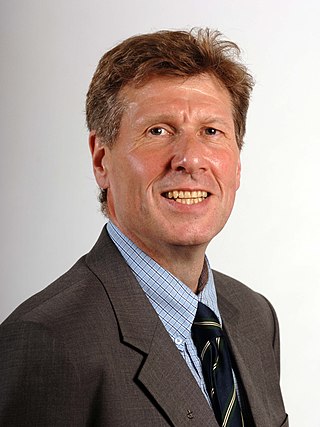
Abdelbaset al-Megrahi was convicted on 31 January 2001 by a special Scottish Court in the Netherlands for the bomb attack on Pan Am Flight 103 on 21 December 1988 over Lockerbie. After he was diagnosed with terminal prostate cancer, he was released from prison on compassionate grounds on 20 August 2009, having served 8½ years of a life sentence. His release was authorised by Scottish Justice Secretary Kenny MacAskill. The decision attracted significant news coverage, engendering widespread celebration in Libya, a largely hostile reaction in the United States and a more equally divided reaction in Britain.

Relations between Libya and the United Kingdom were initially close and positive after the British Armed Forces helped rebel forces to topple Muammar Gaddafi's regime in the 2011 Libyan Civil War. British officials have visited Libya several times since then, including two visits by Prime Minister David Cameron on which large crowds turned out to welcome him. The British Armed Forces are also helping to train Libya's National Army as part of wider cooperation on security matters. Security conditions have deteriorated since 2014, when the United Kingdom suspended operations from their embassy in Tripoli, into a second civil war. In June 2022, the United Kingdom re-opened its embassy in Tripoli.
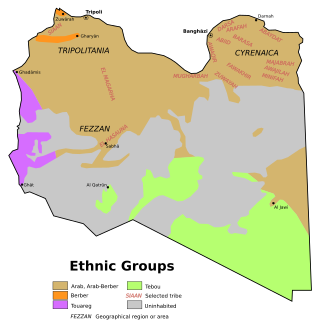
The Magarha is one of the major Arab tribes of Libya. They originate from Fezzan province of Libya and have been an influential supporters and beneficiaries of Muammar Gaddafi during his long rule and then Libya's 2011 civil war. Some Magarha have relocated to Sirte and elsewhere along the coast.
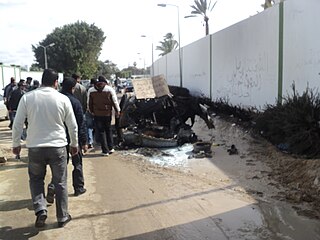
United Nations Security Council Resolution 1970 was a measure adopted unanimously by the UN Security Council on 26 February 2011. It condemned the use of lethal force by the government of Muammar Gaddafi against protesters participating in the Libyan Civil War, and imposed a series of international sanctions in response.
The LSE–Gaddafi affair was a scandal in the United Kingdom that occurred as a result of relationship that existed between the London School of Economics (LSE) and the Libyan government and its leader Muammar Gaddafi and his son Saif al-Islam Gaddafi.
Abdelhakim Belhaj is a Libyan politician and military leader. He is the leader of the Islamist al-Watan Party and former head of the Tripoli Military Council. He was the emir of the defunct Libyan Islamic Fighting Group, an anti-Gaddafi guerrilla group.
Safia Farkash Gaddafi is a Libyan businesswoman. She is the widow of former Libyan leader Muammar Gaddafi, former First Lady of Libya and Representative of Sirte, and mother of seven of Gaddafi's eight biological children, some of whom participated in their family's regime.
General Ali Sharif al-Rifi was the commander of the Libyan Air Force until 2011 when his air force was destroyed by the NATO attacks during the Libyan Civil War. Subsequently, he was reported to be living in Niger before returning to Libya.

The killing of Muammar Gaddafi took place on 20 October 2011 after the Battle of Sirte. Muammar Gaddafi, the deposed leader of Libya, was found west of Sirte after his convoys were attacked by NATO aircraft, as part of the 2011 NATO military intervention in Libya. He was then captured by National Transitional Council (NTC) forces and killed shortly afterwards.
The international reactions to the killing of Muammar Gaddafi concern the responses of foreign governments and supranational organisations to the killing of former Libyan leader Muammar Gaddafi at the Battle of Sirte, the last major engagement of the 2011 Libyan civil war, on 20 October 2011.

The Secret Intelligence Service (SIS), commonly known as MI6, is the foreign intelligence service of the United Kingdom, tasked mainly with the covert overseas collection and analysis of human intelligence on foreign nationals in support of its Five Eyes partners. SIS is one of the British intelligence agencies and the Chief of the Secret Intelligence Service ("C") is directly accountable to the Foreign Secretary.
Sir Richard Leon Paniguian was a British oil industry executive with ties to British intelligence. As described in an obituary for The Telegraph, Paniguian was a long-time troubleshooter and project manager for British Petroleum in some of its most challenging territories.
References
- 1 2 3 4 "Sir Mark Allen". St Antony's College, University of Oxford. 23 December 2014. Retrieved 5 October 2016.
- 1 2 3 4 "Mark Allen". London School of Economics. Archived from the original on 3 March 2011. Retrieved 23 February 2011.
- ↑ "Belhaj Boudchar & Al-Saadi Claims | Leigh Day Solicitors". www.leighday.co.uk. Archived from the original on 24 March 2017. Retrieved 30 October 2014.
- ↑ Robert Winnett (22 July 2010). "BP's MI6 adviser called before Senate over Libya deal". Daily Telegraph. Retrieved 23 February 2011.
- ↑ Tom Baldwin (4 September 2009). "Sir Mark Allen has spent years negotiating deals with Libya". The Times. Retrieved 23 February 2011.
- ↑ Kim Sengupta (6 September 2011). "Libyan rebel leader says MI6 knew he was tortured". The Independent . Retrieved 6 September 2011.
- ↑ "British spy chief's alleged role in abducting Libyan torture victim to be revealed". Middle East Eye. 19 February 2017. Retrieved 20 February 2017.
The case, which is likely to send shockwaves through the British intelligence community, will hear the application for a judicial review of the CPS's decision not to charge MI6's former counterterrorism director, Sir Mark Allen, over the abduction of Abdel Hakim Belhaj and his pregnant wife, who were transferred to Libya in a joint CIA-MI6 operation in 2004.
- ↑ Casciani, Dominic (10 May 2018). "The documents trail that nailed UK's role in rendition". BBC News.
- ↑ "About Us". Hospital Of St John & St Elizabeth.
- ↑ Allen, Mark (7 March 2005). First Holy Communion: With a Foreword by His Excellency Archbishop Giovanni Tonucci. ISBN 0860123928.
External links
Text is available under the CC BY-SA 4.0 license; additional terms may apply.
Images, videos and audio are available under their respective licenses.